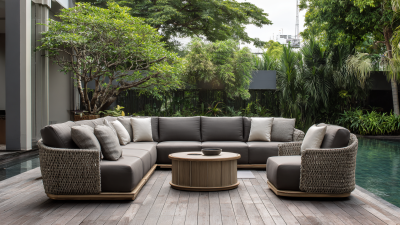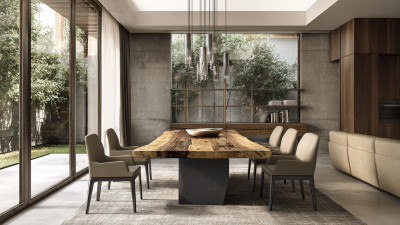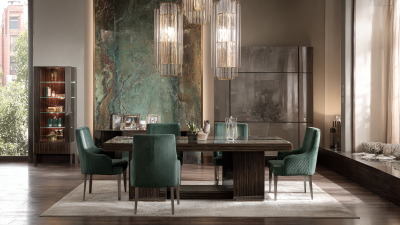Ultimate Guide to Choosing the Best Patio Furniture for Your Outdoor Space
When it comes to enhancing your outdoor living space, selecting the right patio furniture is essential for both functionality and aesthetics. According to a recent report by IBISWorld, the outdoor furniture industry has seen a steady growth rate of 3.2% annually, with a market value projected to reach $6.5 billion in 2023. This rise in popularity reflects a significant shift in consumer behavior as more homeowners prioritize their outdoor areas as extensions of their living spaces.

Additionally, a survey conducted by the American Society of Landscape Architects revealed that 80% of respondents consider outdoor furniture a key component of landscape design, emphasizing the importance of choosing quality and stylish options. In this ultimate guide, we will explore crucial factors to consider when selecting the best patio furniture to suit your unique outdoor environment, ensuring you create a stylish and comfortable retreat right at home.
Factors to Consider When Selecting Patio Furniture for Longevity and Comfort
When selecting patio furniture for your outdoor space, prioritizing longevity and comfort is essential. Choose materials that can withstand the elements, such as weather-resistant metals, synthetic wicker, and marine-grade fabrics. These materials not only enhance durability but also ensure your furniture looks great year after year. Look for pieces that are easy to maintain and clean, allowing you to enjoy more time relaxing rather than worrying about upkeep.
Comfort is equally crucial when choosing your outdoor seating. Consider options that offer ergonomic designs and plush cushioning. For instance, versatile lounge chairs and sectionals often provide customizable configurations that cater to your lounging needs. It's worth testing multiple styles to determine what feels best for you; after all, your patio is an extension of your home where relaxation and social gatherings should thrive.
Remember, investing in high-quality patio furniture can significantly enhance your outdoor experience, making it a key element of your home that brings joy and comfort for many seasons to come.
Material Comparisons: Aluminum vs. Wood vs. Wicker for Outdoor Durability
When selecting patio furniture, the material you choose can greatly affect both aesthetics and durability. Aluminum is often praised for its lightweight and rust-resistant properties, making it an ideal choice for those in humid or coastal areas. Its sleek, modern look can fit various décor styles, and maintenance is minimal—just a simple wipe down is usually all it needs. Additionally, aluminum furniture often comes with powder coating, enhancing its resistance to fading and scratching.
On the other hand, wood brings a timeless appeal to outdoor spaces. Teak and cedar are popular options due to their natural oils that provide inherent weather resistance. While wood furniture requires more maintenance, including periodic sealing and treatment to prevent warping or cracking, the beauty and warmth it adds to patios are unmatched. Many people appreciate the unique grain patterns and colors that evolve over time, giving each piece character.

Understanding Ergonomics: How to Choose Comfortable Seating for Your Space
When selecting patio furniture, comfort should be a top priority, and understanding ergonomics can greatly enhance your outdoor experience. Ergonomic seating is designed to provide optimal support to the body, promoting good posture and reducing strain during extended periods of sitting. Look for chairs that have contoured seats and backrests, allowing your body to relax while enjoying the great outdoors.
**Tip:** Consider adjustable seating options. Chairs that allow you to modify the height or recline slightly can cater to different body types and preferences, ensuring that everyone remains comfortable.
Another critical aspect of ergonomics is the height of your furniture. A seating arrangement too low or too high can lead to discomfort after long periods. Aim for a height that encourages ease of getting in and out of the chair. Additionally, adding cushions with good lumbar support can transform standard furniture into a cozy retreat.
**Tip:** Test the furniture before purchasing. Sit down and see how it feels—pay attention to the support it offers your back and legs to ensure it meets your needs perfectly.
Ultimate Guide to Choosing the Best Patio Furniture for Your Outdoor Space - Understanding Ergonomics: How to Choose Comfortable Seating for Your Space
| Type of Furniture | Material | Comfort Rating (out of 5) | Price Range (USD) | Ergonomic Features |
|---|---|---|---|---|
| Lounge Chair | Aluminum | 4.5 | 150 - 300 | Adjustable recline, padded seat |
| Dining Set | Teak | 4.0 | 400 - 800 | Curved backrest, cushioned seats |
| Bench | Wood | 3.5 | 100 - 250 | Wide seat, ergonomic spacing |
| Hammock | Cotton | 5.0 | 50 - 150 | Body-hugging design, adjustable height |
| Sectional Sofa | Wicker | 4.8 | 600 - 1200 | Deep seating, lumbar support |
Weather Resistance: Choosing Fabrics and Finishes That Stand the Test of Time
When selecting patio furniture, one of the most critical aspects to consider is weather resistance. Outdoor furniture is constantly exposed to elements like sunlight, rain, and humidity, which can quickly lead to deterioration if not made from appropriate materials. To ensure longevity, it’s essential to choose fabrics that are specifically designed for outdoor use. Look for textiles made from synthetic fibers such as polyester or acrylic, as these materials are often treated for UV protection and mildew resistance, making them ideal for various climates.
In addition to the fabric, the finishing of the furniture plays a significant role in its durability. For wooden pieces, opt for options like teak or cedar, which naturally resist moisture and insect damage. Metal furniture can benefit from powder-coating finishes that provide an added layer of protection against rust and corrosion. Lastly, don't forget about maintenance; regular cleaning and protective treatments can significantly extend the life of your patio furniture, keeping it looking great through all seasons. Investing in high-quality, weather-resistant materials will ensure that your outdoor space remains stylish and functional year after year.
Durability of Outdoor Fabrics
This chart illustrates the UV resistance of various outdoor fabric types, indicating their durability in outdoor conditions.
Budgeting Wisely: Balancing Cost and Quality in Your Patio Furniture Investment
When it comes to investing in patio furniture, budgeting wisely is essential to ensure you get the best value without compromising quality. The first step in your budgeting process is to establish a clear range of what you are willing to spend. Consider both immediate costs and long-term value. Sometimes, opting for slightly higher-quality pieces can save you money in the long run, as they typically last longer and withstand various weather conditions.
Tip: Always prioritize essential items like seating and dining sets, which form the core of your outdoor space, before splurging on decor or accessories. Additionally, keep an eye out for sales and seasonal discounts, which can significantly reduce costs.
Another way to balance cost and quality is to explore different materials. While wood offers classic appeal, metal and resin can provide durability with less maintenance. Tip: Research the benefits of each material type, compare prices, and seek recommendations from trusted retailers. This approach not only helps you make informed choices but also aligns with your budget effectively.

Related Posts
-

Finding Quality Suppliers for the Best Outdoor Sofa in a Competitive Market
-

Advantages of Choosing a Modern Dining Table Set for Your Home
-

Unconventional Dining Table and Chairs Alternatives to Elevate Your Space
-

Understanding Challenges with Wood Dining Chairs: A Deep Dive into Common Consumer Issues and Industry Trends
-

Innovative Kitchen Table Designs That Transform Your Dining Experience
-

What is the Impact of Best Modern Dining Sets on Global Home Furnishing Trends?